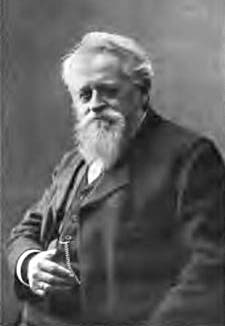
Adam Wilhelm Siegmund Günther
 المؤلف:
J E Hofmann
المؤلف:
J E Hofmann
 المصدر:
Biography in Dictionary of Scientific Biography
المصدر:
Biography in Dictionary of Scientific Biography
 الجزء والصفحة:
...
الجزء والصفحة:
...
 16-1-2017
16-1-2017
 1060
1060
Born: 6 February 1848 in Nuremberg, Germany
Died: 3 February 1923 in Munich, Germany

Adam Günther's father was Ludwig Leonard Günther, who was a Nuremberg businessman, and his mother was Johanna Weiser. Günther began his university studies of mathematics and physics in 1865. It was common at this time for students in Germany to study at several different universities, and indeed Günther carried this out with enthusiam for he studied at the universities of Erlangen, Heidelberg, Leipzig, Berlin and Göttingen. While he was undertaking research for his doctorate political events intervened to interrupt his studies.
In 1870 the political situation between France and Prussia was deteriorating. The popularity of Napoleon III, the French emperor, was declining in France and he thought a war with Prussia might change his political fortunes since his advisers having told him that the French Army could defeat Prussia. Bismarck, the Prussian chancellor, saw a war with France as an opportunity to unite the South German states. With both sides feeling that a war was to their advantage, the Franco-Prussian War became inevitable. On 14 July, Bismarck sent a telegram aimed at infuriating the French government. He succeeded, for on the 19 July France declared war on Prussia. Günther participated in the war which ended in the defeat of France in 1871.
At the end of the war Günther returned to complete his doctoral dissertation and the degree was awarded by Erlangen for Studien zur theoretischen Photometrie in 1872. He also took his examinations to qualify as a teacher of mathematics and physics and, in 1872, he began teaching mathematics at a school in Weissenburg, Bavaria. In the following year he submitted a habilitation thesis to Erlangen: Darstellung der Näherungswerte der Kettenbrüche in independenter Form.
With his qualification to teach in universities, Günther became a docent at Munich Polytechnicum in 1874. There he taught mathematics, then two years later he was appointed professor of mathematics and physics at the Gymnasium in Ansbach also in Bavaria.
After holding this position for ten years, Günther moved back to Munich in 1886 when he was appointed as professor of geograghy at the Technische Hochschule there. He held this post until he retired in 1920 but, in addition, he was rector of the school from 1911 to 1914.
The legislature of the German Empire became known as the Reichstag from 1871. This revived the name of the legislature of the Holy Roman Empire which was used from the 12th century to 1806. Günther served on the Reichstag from 1878 to 1884 as a member of the Liberal Party, then he served on the Bavarian Landtag, the state parliament of Bavaria, from 1884 to 1899 and again from 1907 to 1918 again as a Liberal. During World War I he headed the Bavarian flying weather service.
Günther's contributions to mathematics include a treatise on the theory of determinants (1875), hyperbolic functions (1881), and the parabolic logarithm and parabolic trigonometry (1882). He also wrote [1]:-
... numerous books and journal articles [which] encompass both pure mathematics and its history and physics physics, geophysics, meteorology, geography, and astronomy. The individual works on the history of science, worth reading even today, bear witness to a thorough study, a remarkable knowledge of the relevant secondary literature, and a superior descriptive ability.
- J E Hofmann, Biography in Dictionary of Scientific Biography (New York 1970-1990).
http://www.encyclopedia.com/doc/1G2-2830901763.html
 الاكثر قراءة في 1840to1849
الاكثر قراءة في 1840to1849
 اخر الاخبار
اخر الاخبار
اخبار العتبة العباسية المقدسة


